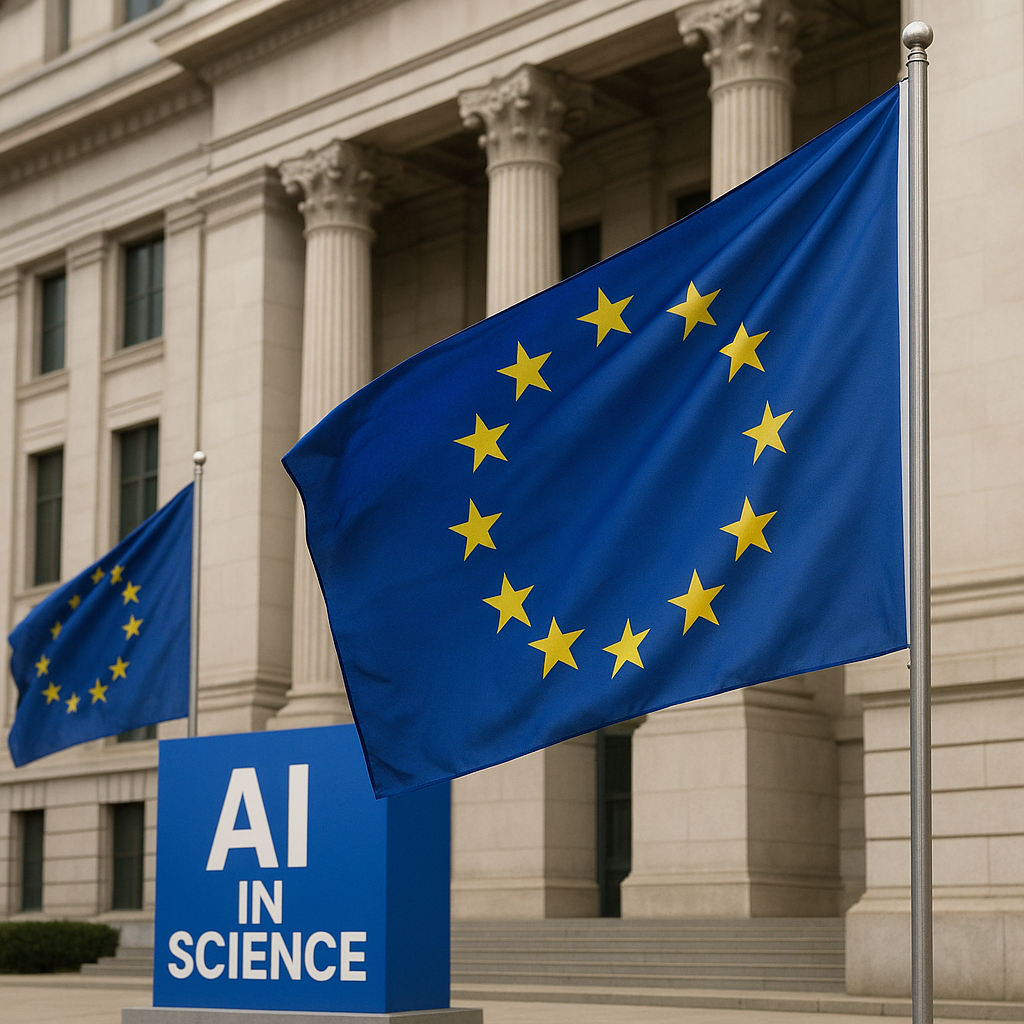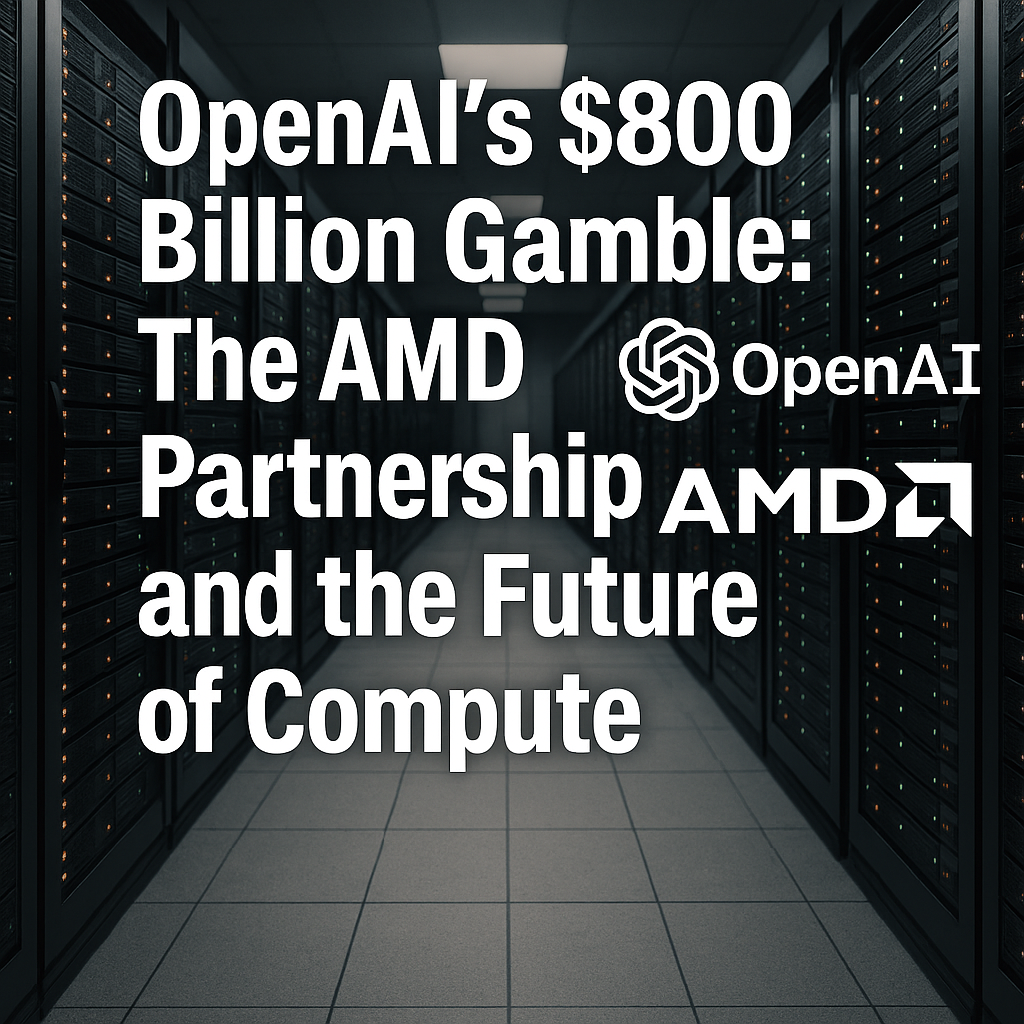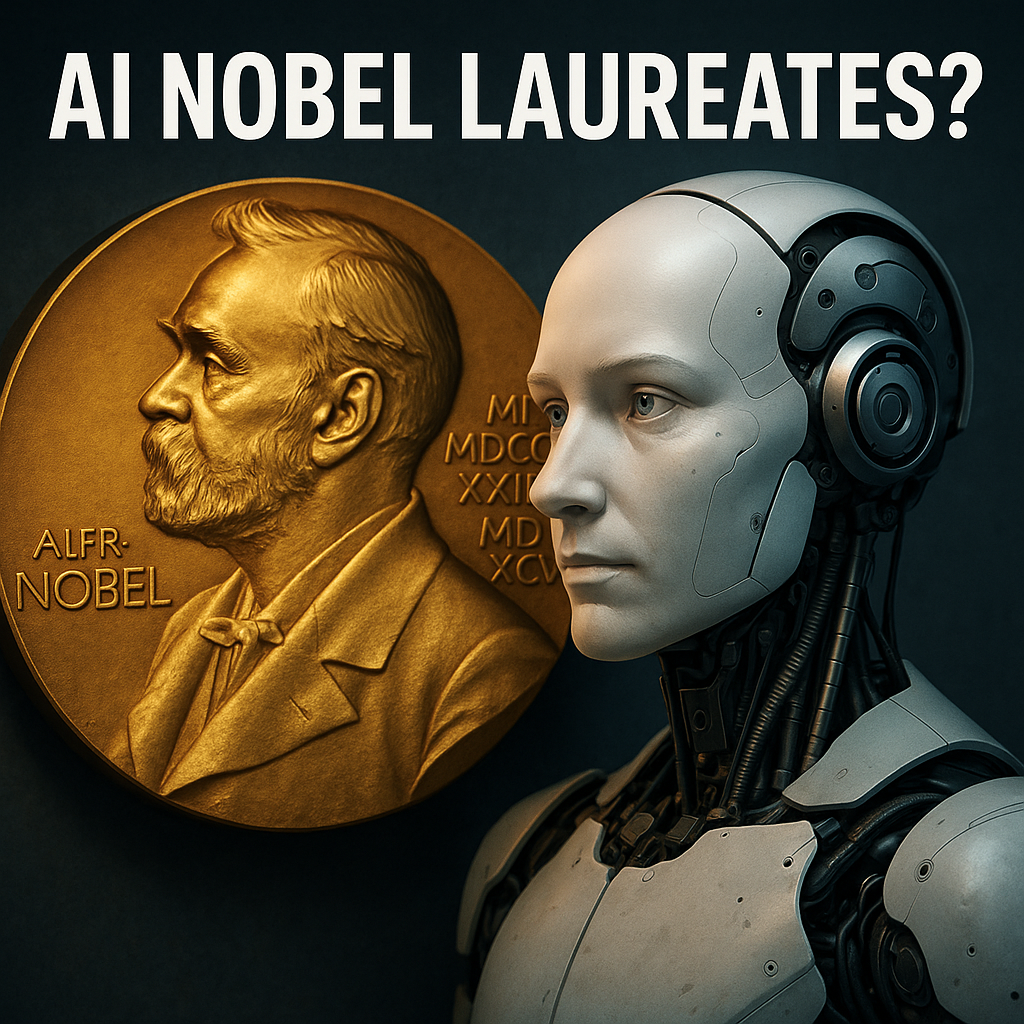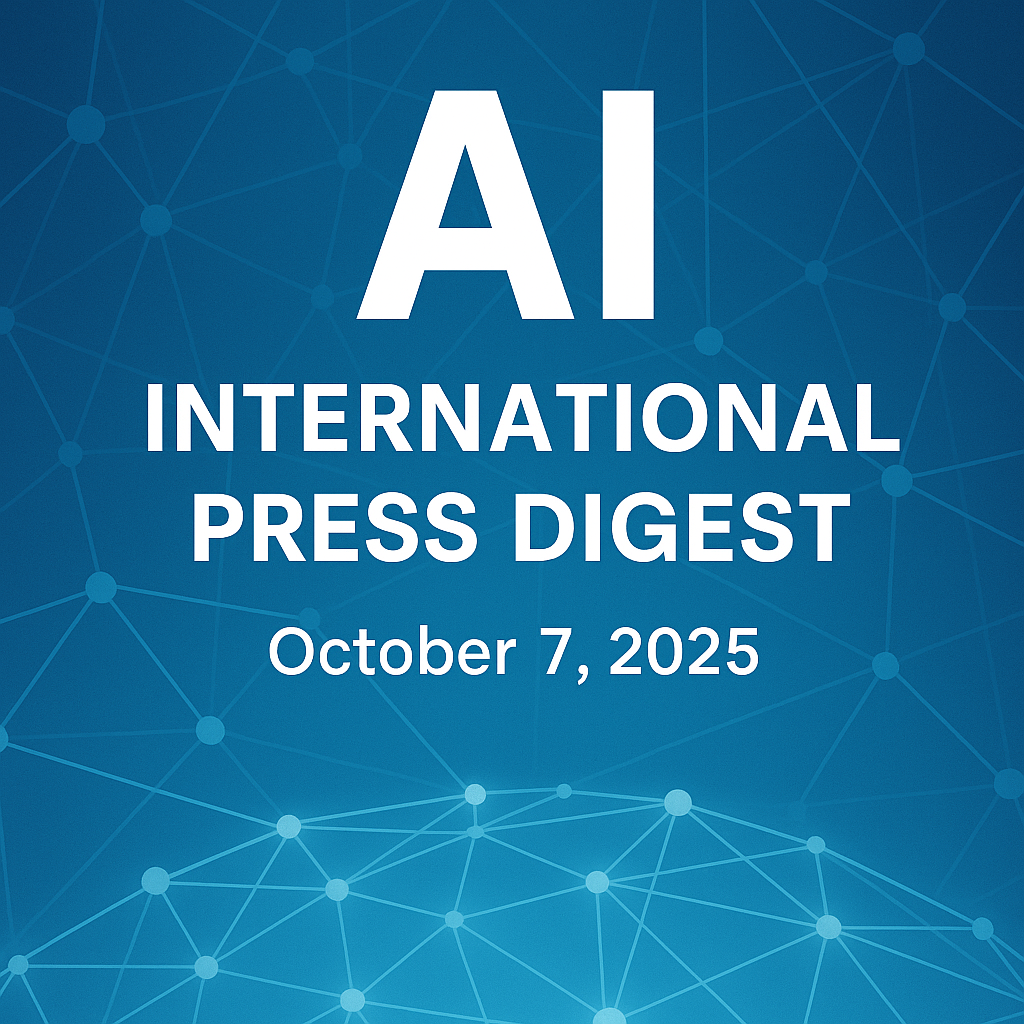The intensifying AI race reveals a critical intersection of governance, infrastructure, and ethics that demands immediate attention. Understand the importance of balancing governance with infrastructure investments to effectively compete in the AI landscape and ensure responsible development. By prioritizing ethical frameworks and accountability, we can harness AI's full potential while safeguarding against potential harms.
Europe's €100 Million AI in Science Strategy: A Challenge to US Dominance
Europe is stepping up its game in the global AI race with a bold new initiative aimed at leveraging artificial intelligence to accelerate scientific discovery. The European Commission recently adopted the AI in Science Strategy, a comprehensive plan backed by a significant financial commitment to foster innovation and collaboration across the continent. Let's delve into the specifics of this strategy and its potential impact on the global AI landscape.
Investing in AI-Driven Scientific Breakthroughs
At the heart of Europe's strategy is a €100 million investment distributed across five pilot programs. These programs are designed to explore how AI can revolutionize various scientific domains, with a particular emphasis on pressing global challenges. These pilot programs are expected to spur innovation and facilitate the development of AI-powered solutions in critical areas like:
Climate change: Developing AI models to predict climate patterns, optimize energy consumption, and accelerate the transition to sustainable practices.
Health: Utilizing AI to improve disease diagnosis, personalize treatment plans, and accelerate drug discovery.
Clean technologies: Applying AI to design more efficient and sustainable materials, processes, and technologies for a cleaner environment.
This targeted investment underscores Europe's commitment to not only advancing AI research but also applying it to solve real-world problems that affect us all.
RAISE: A Virtual 'CERN for AI'

A cornerstone of the AI in Science Strategy is the creation of the Resource for AI Science in Europe (RAISE). This initiative envisions a virtual research environment, often described as a 'CERN for AI,' where researchers across Europe can collaborate, share resources, and collectively push the boundaries of AI-driven scientific discovery. RAISE seeks to address the fragmentation of AI research efforts across Europe by:
Pooling resources: Facilitating the sharing of data, computing infrastructure, and expertise among researchers.
Attracting talent: Creating a vibrant and collaborative environment that attracts top AI researchers from around the world.
Streamlining funding: Providing a centralized platform for accessing funding opportunities and supporting innovative research projects.
Technological Sovereignty and Reduced Dependence
Beyond fostering scientific discovery, Europe's AI in Science Strategy also aims to enhance its technological sovereignty in the field of AI. A key aspect of this goal is reducing dependence on U.S. cloud platforms. By building its own robust AI infrastructure and fostering domestic innovation, Europe seeks to ensure that it has greater control over its AI research and development efforts. This push for technological independence reflects a broader trend among nations seeking to secure their position in the rapidly evolving AI landscape. It's also a recognition that AI has become so fundamental, that control over the underlying infrastructure is essential for long-term competitiveness.
The EU's AI strategy could benefit from AI tools to improve efficiency and accuracy. For example, DeepL could facilitate cross-border collaboration by instantly translating research papers and communications, while Otter.ai could streamline meetings and transcribe important discussions, saving researchers time and effort.
Europe's AI in Science Strategy represents a significant step towards establishing the continent as a major player in the global AI arena. By investing in targeted research programs, creating a collaborative research environment, and striving for technological sovereignty, Europe is positioning itself to not only advance the frontiers of AI but also leverage its power to address some of the world's most pressing challenges. This commitment to AI-driven scientific discovery promises to reshape the global AI landscape and drive innovation for years to come.
OpenAI's $800 Billion Gamble: The AMD Partnership and the Future of Compute
In a move that has sent shockwaves through the tech world, OpenAI is reportedly partnering with AMD to deploy a staggering 6 gigawatts of computing power, signaling an unprecedented investment in AI infrastructure and compute capabilities. This ambitious project represents an $800 billion gamble on the future of AI, and it underscores OpenAI's commitment to staying at the forefront of the AI revolution.
Betting Big on AI Infrastructure
This partnership involves not just a massive deployment of AMD hardware, but also a significant financial commitment. OpenAI's warrants for AMD shares further solidify the alignment between the two companies, indicating a long-term strategic alliance. This level of investment highlights the escalating costs associated with training and deploying increasingly sophisticated AI models. To put it into perspective, 6 gigawatts is enough to power several major cities, illustrating the sheer scale of OpenAI's ambition. These massive deployments are necessary to power tools like ChatGPT, a versatile AI chatbot capable of generating text, translating languages, and providing informative answers, pushing the boundaries of what's possible with AI.
ChatGPT's Explosive Growth and the Scaling Debate

Fueling this investment is the phenomenal growth of OpenAI's flagship product. ChatGPT has now reached 800 million weekly active users, a testament to its widespread adoption and utility. However, this meteoric rise also sparks a debate: Is this level of scaling truly necessary to advance AI, or are we witnessing a speculative bubble? Some argue that the current race for compute power is driven by genuine advancements in AI capabilities. Others suggest that it's a self-perpetuating cycle, where companies invest heavily in infrastructure simply to stay ahead of the competition, regardless of the actual return on investment. The truth likely lies somewhere in between.
Sam Altman's Vision and the Future of Compute
Regardless of the underlying motivations, OpenAI's investment reflects the bold vision of its CEO, Sam Altman, who believes that massive compute power is the key to unlocking the next generation of AI breakthroughs. This approach suggests that advancements in AI will be primarily driven by scaling up existing models and architectures, rather than developing entirely new algorithms or approaches. For example, tools like DeepSeek, known for its cost-effectiveness and powerful language processing, also benefit from increased compute capabilities. However, the ethical implications of this AI arms race, particularly in areas like AI warfare, cannot be ignored.
Ultimately, OpenAI's $800 billion gamble raises fundamental questions about the future of AI. Is it a necessary step towards achieving artificial general intelligence (AGI), or a sign of unsustainable hype? Only time will tell whether this investment will pay off, but one thing is certain: it will have a profound impact on the trajectory of AI development in the years to come.
Bank of England Embraces AI: Enhancing Financial Stability
The Bank of England is not just watching the AI revolution unfold; it's actively participating, strategically leveraging artificial intelligence to bolster monetary and financial stability. As AI becomes increasingly intertwined with the global economy, central banks like the Bank of England recognize the imperative to understand, adopt, and govern AI technologies within their own operations and the broader financial ecosystem.
The Four Pillars of AI Strategy
The Bank of England's approach to AI is built upon four strategic pillars designed to ensure responsible and effective integration:
Governance: Establishing clear ethical guidelines and robust oversight mechanisms to ensure AI systems are used responsibly and transparently. This includes addressing potential biases and ensuring accountability in AI decision-making processes. Effective AI governance also means staying ahead of regulatory challenges and contributing to the development of industry standards.
Access: Democratizing access to AI tools and training for staff, fostering a culture of AI literacy and innovation within the organization. By providing employees with the resources to experiment and learn, the Bank can unlock the full potential of AI across various departments.
Innovation: Encouraging experimentation and the development of AI-powered solutions to enhance the Bank's core functions, such as economic forecasting, risk management, and market surveillance. The Bank also actively collaborates with fintech companies and research institutions to explore cutting-edge AI applications in finance.
Automation: Streamlining routine tasks and processes through AI, freeing up human capital for higher-value activities and improving operational efficiency. This includes automating data analysis, report generation, and other time-consuming tasks, enabling staff to focus on strategic initiatives.
A Pragmatic Approach with Rigorous Risk Management
The Bank of England is characterized by a pragmatic approach. It prioritizes rigorous risk management to mitigate potential downsides. The Bank's AI strategy acknowledges the inherent risks associated with AI, such as model bias, data privacy concerns, and the potential for unintended consequences. By implementing robust risk assessment frameworks and ongoing monitoring, the Bank aims to minimize these risks and ensure the responsible deployment of AI technologies. This also includes aligning with broader governance frameworks, as tools such as Microsoft Copilot bring new capabilities, as well as risks to manage.
AI Adoption in the UK Financial Sector
According to recent reports, a staggering 75% of UK financial firms now use AI operationally, reflecting the rapid pace of AI adoption in the sector. This widespread adoption underscores the transformative potential of AI in finance, but it also highlights the need for effective AI governance and risk management frameworks. Areas like AI in education are also seeing the benefits of AI adoption, but the financial sector is in the lead.
The Bank of England's proactive AI strategy serves as a model for other central banks and financial institutions worldwide. By embracing AI responsibly and strategically, the Bank aims to enhance its ability to maintain monetary and financial stability in an increasingly complex and uncertain world. As the AI revolution continues to unfold, the Bank of England is committed to staying at the forefront of innovation, ensuring that AI benefits the financial system and the broader economy.
The Dark Side of AI: Microsoft, OpenAI, and Military Collaboration Controversy

The rapid advancement of AI has sparked not only excitement but also serious ethical concerns, particularly regarding its collaboration with military entities. The partnership between tech giants like Microsoft and OpenAI and defense forces, specifically the Israeli military, has ignited considerable controversy.
AI in Conflict Zones: A Growing Concern
Reports indicate a surge in AI usage in areas like Gaza and Lebanon following October 7, 2023. This increased deployment raises critical questions about the technology's impact on conflict resolution and civilian safety. AI's ability to process vast amounts of data, identify patterns, and automate tasks makes it a powerful tool, but also one that demands careful oversight. For instance, tools like ChatGPT, known for its ability to generate human-like text and engage in conversations, are raising eyebrows as they get integrated into surveillance systems, potentially blurring the lines between information gathering and privacy invasion.
Autonomous Weapons and the Ethical Minefield
The integration of AI into autonomous weapons systems is one of the most fiercely debated topics. Should machines be granted the authority to make life-or-death decisions on the battlefield? This question cuts to the heart of AI ethics. The potential for algorithmic bias, the lack of human empathy, and the risk of unintended consequences all contribute to the unease surrounding AI-driven warfare. The debate extends to how we regulate AI News and its deployment in such sensitive contexts.
The Need for Regulation and Oversight
Given these challenges, the call for stricter regulation of AI in warfare is growing louder. International bodies and governments are grappling with the need to establish clear guidelines and ethical frameworks to govern the development and deployment of AI-powered military technologies. Striking a balance between leveraging AI's potential to enhance defense capabilities and mitigating the risks of unintended harm or escalation remains a crucial task. The exploration of AI in Practice needs to happen now so that there is a guiding framework in place.
The convergence of AI and military operations presents a complex web of opportunities and risks. As AI continues to evolve, it is imperative that we engage in open and honest discussions about its ethical implications and establish robust regulatory mechanisms to ensure its responsible use in the realm of conflict.
AI Nobel Laureates: Will AI Win Science's Top Prize?

Could the future of scientific accolades include AI? The question of whether an AI could ever win a Nobel Prize is sparking intense debate, pushing the boundaries of how we define creativity, discovery, and the very essence of human ingenuity. Some researchers believe that AI, with its increasing capabilities, might one day be recognized for groundbreaking contributions to science, literature, or even peace. But can an algorithm truly be creative, or is it merely mimicking intelligence?
The Nobel Turing Challenge
Fueling this debate is the concept of the Nobel Turing Challenge, an informal yet compelling benchmark for AI. This challenge proposes that AI should not only be able to perform tasks that require human-level intelligence but also achieve discoveries worthy of a Nobel Prize. This ambition underscores the desire to see AI not just as a tool, but as a potential partner in scientific exploration. The Turing test evaluates a machine's ability to exhibit intelligent behavior equivalent to, or indistinguishable from, that of a human. Imagine the day when AI not only passes the Turing test but also makes a discovery so profound that it redefines our understanding of the universe.
AI's Foray into Scientific Discovery
AI is already making waves in materials science and disease treatment, areas where the sheer volume of data and complexity of interactions often overwhelm human researchers. AI algorithms can sift through massive datasets, identify patterns, and predict outcomes with remarkable accuracy. Consider, for example, how AI is accelerating drug discovery by predicting the efficacy of potential drug candidates, or how it's helping to design new materials with specific properties. These are significant advancements, yet the question remains: are these "discoveries" or simply highly efficient analyses?
Gemini's Gold Medal Performance
The capabilities of AI are constantly evolving. Google's Gemini, for example, has demonstrated gold medal-level performance in coding competitions, showcasing its ability to generate complex and efficient code. It has quickly become a powerful tool that can analyze, understand, and generate multiple types of code across nearly every major programming language. This is a step beyond simple automation; it’s a demonstration of problem-solving and creative coding. If AI can excel in fields requiring logical reasoning and creativity, could it eventually achieve the kind of groundbreaking insights that earn Nobel recognition?
AI: The Independent Researcher
The idea of AI as an independent researcher, formulating hypotheses, designing experiments, and interpreting results, is no longer science fiction. AI tools are becoming increasingly sophisticated, capable of performing tasks that once required years of training and expertise. The potential for AI to accelerate the pace of scientific discovery is immense, but so are the ethical and philosophical questions that arise. Who gets the credit when AI makes a breakthrough? How do we ensure that AI is used responsibly and ethically in scientific research?
Whether an AI will ever win a Nobel Prize remains an open question. The answer will likely depend not only on AI's technical capabilities but also on our evolving understanding of intelligence, creativity, and the very nature of discovery. As AI continues to push the boundaries of what's possible, it challenges us to reconsider our definitions and expectations of scientific achievement.
Analysis: The Convergence of AI Governance, Infrastructure, and Ethics
The race to dominate AI is intensifying, revealing a critical intersection of governance, infrastructure, and ethics that demands immediate attention. The ambitions of AI governance are increasingly colliding with the practical realities of building and maintaining the necessary infrastructure, while ethical considerations struggle to keep pace with rapidly advancing capabilities. Europe's strategic initiatives and OpenAI's massive investments highlight these tensions, underscoring the need for a balanced and coordinated approach.
Governance vs. Infrastructure: A Growing Divide
The European Union's €100 million AI science strategy represents a significant commitment to fostering AI innovation and ensuring responsible development. However, this ambition faces a stark contrast with OpenAI's reported $800 billion investment in AI infrastructure. This massive disparity raises questions about whether Europe's governance-focused approach can effectively compete with the sheer scale of resources being poured into infrastructure by private entities. While governance frameworks are essential for guiding AI development, they risk becoming irrelevant if not supported by sufficient computational power and data resources. The Bank of England's acknowledgement of AI adoption as essential infrastructure further emphasizes this point, highlighting the need to view AI not merely as a technological advancement but as a fundamental component of modern society. To accelerate infrastructure you could use a tool like Google Cloud AI, a platform for developing, deploying, and scaling AI models using Google's infrastructure.
The Ethical Imperative: Accountability in the Age of AI
As AI capabilities continue to advance, the urgent need for robust ethical frameworks becomes ever more apparent. The potential for misuse, bias, and unintended consequences necessitates a proactive approach to AI ethics. Accountability is paramount. We need mechanisms to ensure that AI systems are developed and deployed in a manner that aligns with human values and societal norms. This includes addressing issues such as algorithmic transparency, data privacy, and the potential displacement of human workers. Tools like Originality AI, which helps detect AI-generated content, are becoming increasingly important in maintaining trust and authenticity.
International Cooperation: A Global Challenge
Addressing the challenges posed by AI requires coordinated international responses. AI knows no borders, and its impact will be felt globally. Cooperation is essential to establish common standards, share best practices, and prevent a fragmented landscape of conflicting regulations. This includes fostering dialogue on issues such as data governance, cybersecurity, and the potential use of AI in warfare. Only through collaborative efforts can we ensure that AI benefits all of humanity while mitigating its risks. News about AI and what different countries are doing can be found at AI News.
In conclusion, the convergence of AI governance, infrastructure, and ethics is a defining challenge of our time. Balancing these elements is crucial for realizing the full potential of AI while safeguarding against its potential harms. As we move forward, a collaborative and forward-thinking approach will be essential to navigate the complex landscape of AI development and ensure a future where AI serves humanity's best interests.
🎧 Listen to the Podcast
Hear us discuss this topic in more detail on our latest podcast episode: https://open.spotify.com/episode/68LlniDkUsrmzbnhnlmQbY?si=UDkDykDSTrWhN6-ECVW9Ag
Keywords: AI, Artificial Intelligence, AI Governance, AI Ethics, OpenAI, Microsoft, European Commission AI Strategy, AI in Science, AI in Military, Bank of England AI, AI Infrastructure, RAISE AI initiative, ChatGPT, AI Nobel Prize, Autonomous Weapons
Hashtags: #AI #ArtificialIntelligence #EthicsInAI #AIScience #TechNews
For more AI insights and tool reviews, visit our website https://best-ai-tools.org, and follow us on our social media channels!
Website: https://best-ai-tools.org
X (Twitter): https://x.com/bitautor36935
Instagram: https://www.instagram.com/bestaitoolsorg
Telegram: https://t.me/BestAIToolsCommunity
Medium: https://medium.com/@bitautor.de
Spotify: https://creators.spotify.com/pod/profile/bestaitools
Facebook: https://www.facebook.com/profile.php?id=61577063078524
YouTube: https://www.youtube.com/@BitAutor



